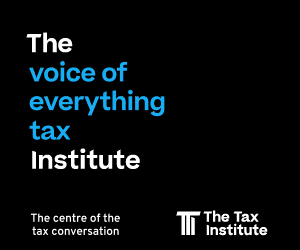How understanding complex corporate taxation matters unlocks career opportunities
Published: 21 Feb 2023


The role of a corporate tax professional is changing as tax systems and companies in Australia are quickly becoming more global and digital. Australian businesses need skilled advice to solve complex tax issues they may have both domestically and internationally.
In this interview, Hansini De Fonseka, The Tax Institute Student Representative and Senior Accountant at William Buck Group, shares her experience of the Corporate Tax subject, the key learnings and who would benefit from enrolling.
Hansini, what brought you to complete the Corporate Tax subject with The Tax Institute?
Corporate Tax is one of the elective subjects offered in the Graduate Diploma of Applied Tax Law. When I read through the subject materials and the course content, I chose Corporate Tax because of the broad range of topics covered. The learning outcomes were relevant for my role and an important focus area for my clients. Given that corporations and companies are prominent and widely used business structures, it gives me an edge to have that specialised tax knowledge.
Can you tell us about the Corporate Tax subject?
Corporate Tax takes a practical look at complex tax areas such as consolidations, capital management, corporate finance, international tax, winding up and liquidations etc.
The modules are very well written and simplified to help students navigate through the course while prompting them to refer to the tax legislation more closely when analysing problems and providing advice.
The case study presented as part of the subject is challenging in that it requires students to apply their newfound knowledge to a practical scenario presented. It encourages students to identify the problems and understand how the different laws interact with each other. Students are then required to provide advice addressing and resolving each of the issues while analysing and evaluating alternate strategies that may be adopted for each situation.
'...it gives me an edge to have that specialised tax knowledge.'
What’s the benefit of enrolling into Corporate Tax?
The corporate tax subject is structured to give students an in depth understanding and knowledge of the tax laws and legislation that affects corporate governance, the way companies are operated and controlled. The course is broad in that the area of focus is not just limited to the domestic issues, but also extends towards international dealings. I think this is quite important given the digitisation of businesses platforms and the current global context in which companies operate.
What are the key learnings from the Corporate Tax subject?
- In-depth understanding of complex tax topics such as consolidations, international tax, corporate restructures, liquidations, capital management etc.
- Identifying and analysing the tax consequences of both simple and more complex scenarios.
- Interpreting tax law to address the various tax issues identified.
- Providing professional and sound advice to resolve the problems identified while adhering to the highest ethical principles.
- Determining alternate strategies and solutions that may be used in resolving a problem.
- Applying tax legislation in resolving both domestic and international issues including the identification of the interaction between domestic and international tax laws.
'... I personally use the knowledge I have acquired
throughout the subject regularly at work...'
How have you applied the knowledge you’ve acquired from Corporate Tax to your day-to-day practice?
The subject touches on the tax issues that tax practitioners come across on a daily basis. The complex tax laws and legislations are broken down and simplified to help students better understand the intention and application of law. I personally use the knowledge I have acquired throughout the subject regularly at work, for example when dealing with consolidated groups, preparing R&D applications, determining international tax implications, utilising company losses and so on.
Who would benefit from enrolling in the subject?
Anyone who would want to specialise in corporate tax would benefit from the subject. It is a very practical subject. The topics covered are very useful and give the students a deep and thorough understanding of the relevant tax laws and their application.
Corporate Tax is your insight into the skills and knowledge you need to successfully interpret tax law to prepare advice, analyse and evaluate alternate strategies relating to corporate groups, public and private companies. It is appropriate for accounting practitioners, corporate tax professionals, lawyers wanting to specialise in estate planning and other financial professionals wanting to build on their existing corporate tax knowledge.
Ready to continue your tax education? Find out more about Corporate Tax.

